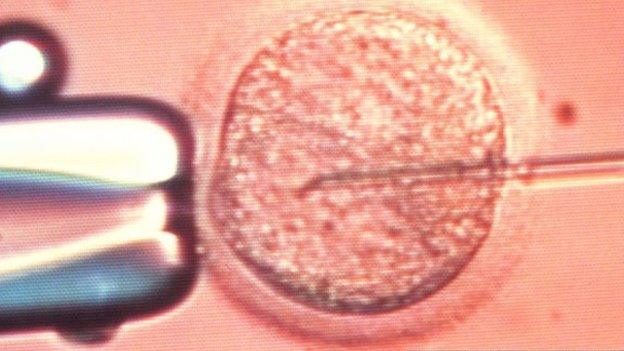Why postcodes are determining fertility treatment
- Published
Samantha and David Peace long to become parents
About 50,000 women undergo IVF treatment in the UK every year, with just under half receiving funding from the NHS.
But soaring costs and budget cuts have made accessing public fertility services increasingly dependent on where you live.
After a year of struggling to conceive, Samantha and David Peace from Chelmsford, in Essex, asked doctors for help to start a family.
They ticked all the right boxes - a young, healthy couple, with no children from previous relationships. But they were turned away.
Unbeknown to them, their local Clinical Commissioning Group in Mid Essex had scrapped its IVF service, leaving the couple, and hundred of others, to fend for themselves.
"We went to a clinic in Essex," Mrs Peace, 34, told BBC Inside Out.
"The receptionist took our postcode and said there's no entitlement for you, while we were sitting at an open day with patients who had received funding.
"I was emotional and angry."
They were told their only option was private treatment at a cost of £6,000 per cycle, with about a one in three chance of success.
"We didn't have the money basically, so we had to speak to our parents. Against my pride, we borrowed my mum's death policy money off of my dad.
"He did it without blinking, but it was quite difficult and put more pressure on it to work."
IVF in numbers
50,000
women have IVF every year in UK
40%
of treatment funded by NHS
-
Number of cycles women should get on NHS: 3
-
Number of CCGs offering this: 18%
-
CCGs charge per cycle: £1,300 - £6,000
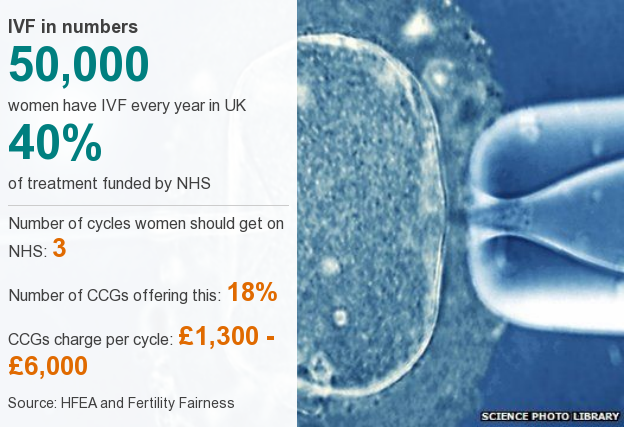
How IVF developed since first 'test-tube baby'
The National Institute for Health and Care Excellence (Nice) recommends women under 40 who are struggling to conceive and meet the right criteria, receive three full cycles of IVF treatment on the NHS to maximise their chances of getting pregnant.
But Clinical Commissioning Groups (CCGs) have the final say on whether the funding is provided, with a growing number choosing to ignore the Nice guidelines, external.
In England just 18% of CCGs offer three full cycles to eligible patients, while about half offer one round of treatment.
Three CCGs - Mid-Essex, North East Essex, and South Norfolk - no longer fund IVF treatment at all, unless circumstances are "exceptional". A fourth, Basildon and Brentwood , external- which is also in Essex - is currently debating whether or not to follow suit and decommission its service.
Health chiefs have blamed the cuts on "extremely challenging financial circumstances".
Each IVF cycle costs individual CCGs anywhere between £1,300 and £6,000, depending on geography.
Mid-Essex said it treated about 100 people a year, and could make annual savings of £750,000 by ending specialist fertility services.
Its medical director, Dr Donald McGeachy, told Inside Out he could understand patients' "displeasure" at the cuts.
But he said with a £9m deficit to plug, tough decisions had to be made.
"We try very hard to provide everything that we need, but there are some things that we are not going to be able to do," Dr McGeachy added.
Mrs Peace believes the decision to decommission services entirely belittles the pain felt by couples suffering from fertility issues.
"I know some cuts are necessary," she said. "But they are making large clustering decisions that affect a lot of people."
"I watched my mum suffer with cancer for 11 years and I wouldn't want anything taken away from illnesses like that.
"I just think IVF has been cut so heavily from something to nothing. There needs to be more awareness of the impact that will have on people's lives."

The national picture
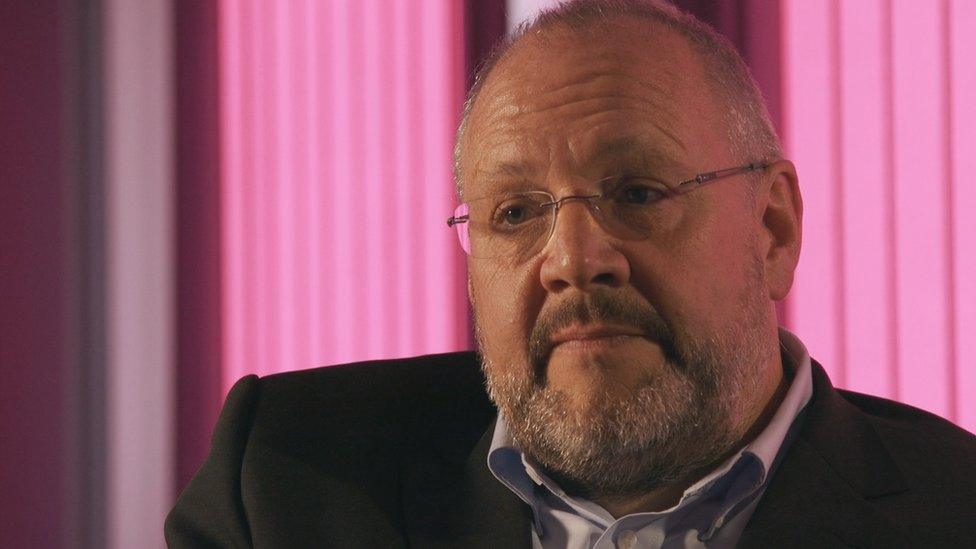
Dr McGeachy says financial pressures mean CCGs have to make savings
- The north of England has the best IVF provision in the country with 29 CCGs offering three cycles
- Eligible patients in Scotland and Wales are offered up to two full cycles
- In Northern Ireland one cycle is provided
- Camden is the only CCG in London to fund three cycles
- Mid Essex, North East Essex and South Norfolk no longer fund any treatment
Statistics: Fertility Fairness

One in six couples in the UK struggles to conceive, making fertility concerns one of the most common reasons women visit their GP.
IVF offers a possible solution, with success rates, external of about 1 in 3 for women under 35.
Mrs Peace underwent a round of privately funded treatment late last year, which was not successful.
The couple will now need to raise more money if they are to have a second chance at starting a family.
Sarah Norcross of campaign group Fertility Fairness said the recent cuts, particularly in Essex, were an example of health inequality.
"In England, we have 211 individual clinical commissioning groups, all making different policies, and this has created a postcode lottery.
"Britain has gone from being a pioneer at the forefront of fertility treatment, to among the worst providers of state funded fertility services in Europe," she added.
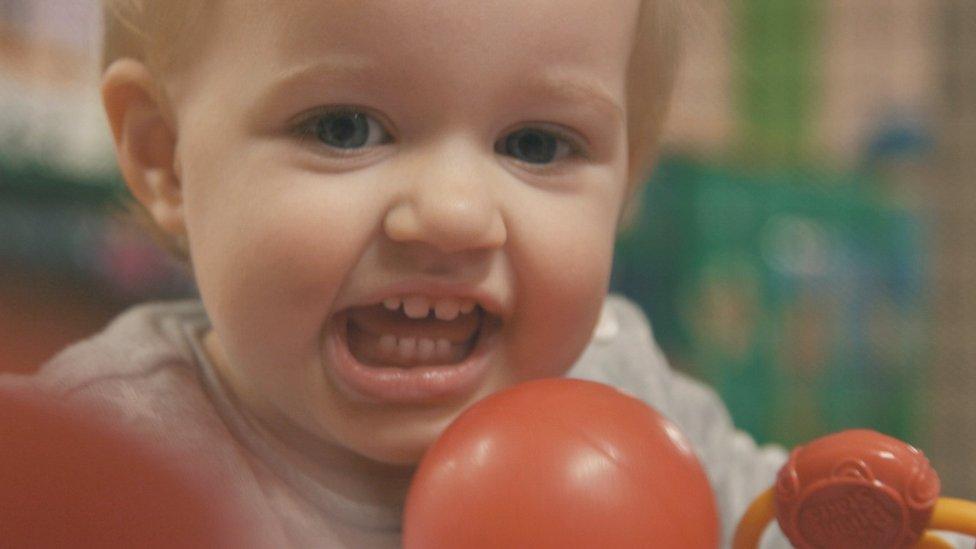
Sidney Gillet's mother Nicola was told at 16 that she'd never have children
The decommissioning of IVF services across Essex also came as a shock to Nicola and Terry Gillet.
Their daughter Sidney was born in Chelmsford in August 2014 following NHS-funded IVF. They say she wouldn't be here without it.
"A baby was something I never thought I'd have, so to have her laid on me was the best moment for me," said 29-year-old Nicola.
"I think if we didn't get that funding it would have broken up a healthy marriage, because it did cause problems. We wouldn't have been able to have a child, as we wouldn't have been able to fund it ourselves."
So can anything be done to reverse the trend and prevent further cuts?
Prof Geeta Nargund, director of Create Fertility in London, believes a "national tariff" would regulate the industry and prevent clinics from overcharging CCGs.
She said if costs to the NHS were capped at about £3,000 a cycle it would ensure fair and equal access to treatment no matter where patients live.
"I hope, as a nation, we will look at that very carefully," she added. "Because when it comes to fertility treatment, we are not working in the spirit of the NHS. It's a postcode health service.
"Infertility is a disease, as defined by the World Health Organisation. It is not something to be ignored and we need to help."
Watch the full film on Inside Out, Monday, 20:30, BBC1 London
- Published25 October 2013
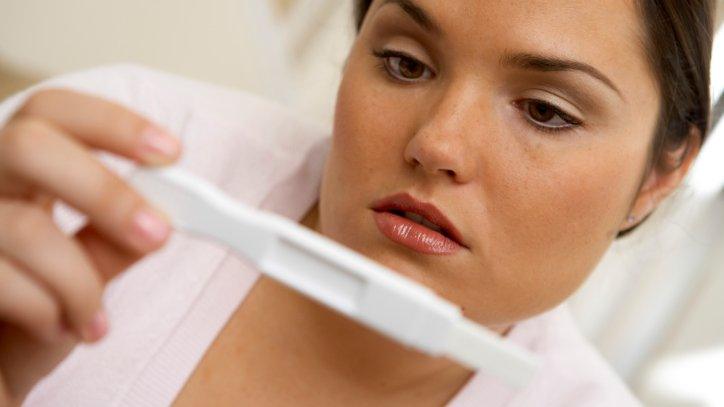
- Published23 July 2015
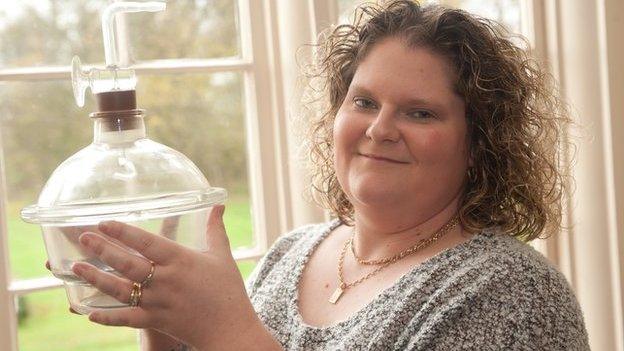
- Published26 September 2014
